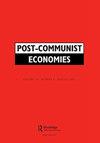加入后的倒退与欧盟的环境政策
IF 1.8
3区 经济学
Q2 ECONOMICS
引用次数: 3
摘要
摘要匈牙利自20世纪90年代末以来一直是中欧和东欧地区的环境领先者,其环境立法逐步但稳步接近欧盟。先前的研究确立了经济和社会利益攸关方在匈牙利基于欧盟环境立法的决策和实施过程中的重要作用。随着FIDESZ党在2010年议会选举中获胜,新政府开始改变“游戏规则”,将基础设施国有化,削弱外国利益相关者的市场准入。文章以水和废物管理部门为重点,分析了匈牙利政府最近政策变化的阶段。我们认为,这些变化偏离了加入欧盟过程中确立的环境政策惯例,代表着匈牙利实施欧盟环境立法的挑战和潜在倒退。政策政策的这种变化需要结合匈牙利最近政治秩序和国家-市场关系的转变来看待。本文章由计算机程序翻译,如有差异,请以英文原文为准。
Post-accession backsliding and European Union environmental policies
ABSTRACT An environmental frontrunner in the Central and Eastern European regions since the late 1990s, Hungary followed a gradual but steady approximation progress to the EU environmental legislation. Previous research established an important role of the participation of economic and societal stakeholders in the decision-making and implementation process based on EU environmental legislation in Hungary. With the victory of the FIDESZ party in the parliamentary elections of 2010, the new government started to change the ‘rules of the game’ by nationalising infrastructures and weakening market access to foreign stakeholders. Focusing on the water and waste management sectors, the article analyzes the stages that brought Hungary to the recent governments’ policy changes. We argue that these changes have departed from the environmental policy practices established during the EU accession process and represent a challenge and a potential backsliding in the implementation of the EU environmental legislation in Hungary. Such changes in policy policies need to be seen in the context of the recent transformation of the political order and of the state–market relations in Hungary.
求助全文
通过发布文献求助,成功后即可免费获取论文全文。
去求助
来源期刊

Post-Communist Economies
ECONOMICS-
CiteScore
4.90
自引率
18.20%
发文量
21
期刊介绍:
Post-Communist Economies publishes key research and policy articles in the analysis of post-communist economies. The basic transformation in the past two decades through stabilisation, liberalisation and privatisation has been completed in virtually all of the former communist countries, but despite the dramatic changes that have taken place, the post-communist economies still form a clearly identifiable group, distinguished by the impact of the years of communist rule. Post-communist economies still present distinctive problems that make them a particular focus of research.
 求助内容:
求助内容: 应助结果提醒方式:
应助结果提醒方式:


